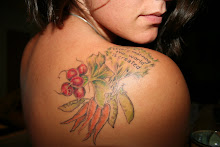lots of changes have happened since my last blog entry, and I am now writing to you from San Francisco, having recently attended the Hazon Food Conference. Hazon is a Jewish environmental organization whose mission is “to create a healthier and more sustainable Jewish community – as a step towards a healthier and more sustainable world for all.” in addition to the food conference, now in its third year, they organize various environmental programming, such as bike rides in Israel and New York, a daily food blog (the Jew & the Carrot) and the first Jewish Community-Supported Agriculture (CSA) program in North America.
the food conference offered a variety of workshops from sourdough making & pickling classes, to discussions on Jewish farming principles & panels on environmentalism and organic farming. one of the keynote speeches, titled The Ethics of Eating: Creating a New Food Future for the 21st Century, was led by Andrew Kimbrell, the Executive Director of the Center for Food Safety. Kimbrell led us in a fascinating discussion about the food that we put in our bodies, where it comes from, and the huge (and often unfortunate) role our government plays in this food. we heard a lot about genetically engineered food and the government’s despicable label – GRAS, generally recognized as safe – which assumes that genetically engineered food is fine for us if it looks, smells and tastes like the non-GMO version of that food, without offering any research to the contrary.
at the Natural Gourmet Institute, where I received my formal culinary training, they teach 5 key characteristics one should look for in the food they eat: local, organic, whole, fresh & seasonal (there are many others, including non-irradated, real, and non-GMO). one of the problems we face as consumers is that irradiated and GMO Frankenstein foods are often not labeled as such. so what can we do in our daily lives & everyday choices to avoid these foods and nourish our bodies with healthy, sustainable foods? Andrew Kimbrell offered three simple answers (though, as he pointed out, he could have offered 30): eat organic, eat local AND organic, and NEVER eat industrial meat. organically certified foods are guaranteed non-GMO, and supporting your local farmers is good for your own health, your community, and the world at large.
what you eat directly supports your values, because where your food dollars go is possibly the most influential decision you make on a daily basis. Kimbrell reminded us that while we only get to decide on our president and our representatives once every four years, and while it takes years to get certain bills and regulations into action, there is one vote we can make every single day. and that is our vote on the kinds of foods and farmers we support – and that’s a vote can be cast at this very moment.
for information on farmer’s markets near you: http://apps.ams.usda.gov/FarmersMarkets/
to support the Organic Farmers Action Network: www.ofrf.org
for information on the Hazon Food Conference: http://www.hazon.org/go.php?q=/food/conference/2008FC/theHazonFoodConference.html




No comments:
Post a Comment